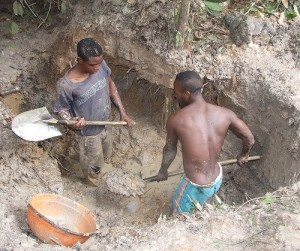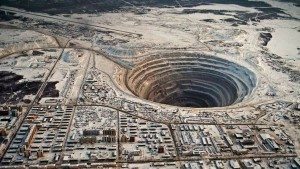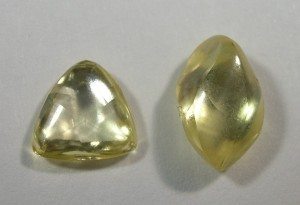Diamond is undoubtedly the rarest and most precious mineral resource. It is very expensive and can only be afforded by the extremely rich, especially in its refined state. Diamonds are used to produce so many durable and beautiful and valuables including very fine and costly jewelries and ornaments. The affluent men of the society who are able to afford jewelries made of diamonds like showing them off in social gatherings to attract attention and esteem.
So many countries of the world are blessed with this natural gem and African countries are not left out. Many of us would be able to mention some countries we know that produce diamond in commercial quantities but only a few may be able to tell who the largest producers are. There are generally 15 diamond producing countries in Africa. They are: Botswana, South Africa, Angola, Namibia, Congo, Zimbabwe, Guinea, Ghana, Congo, Lesotho, Liberia, Sierra Leone, CAR, Tanzania, and Togo. Now, the big question is:
Who are the largest producers of diamond in Africa?
It will be important at this point to let you know that the ratings of countries and their diamond production capacity is never stable over time. It fluctuates year by year such that the largest producer this year may not be the same in the next year thereby making positions to shift much more often than you think.
Top 5 Largest Diamond Producing Countries in Africa at the Moment
5. The Democratic Republic of Congo

The Democratic Republic of Congo used to be one of the leading diamond producing countries not only in Africa but in the world. It produced 19.2 million carats in 2011 making it the second largest producer in Africa by volume after Botswana, which produced 22.9 million carats, according to the latest Kimberley Process (KP) data. The Congo is still the 2nd African country with the largest deposit of the hard rock, diamond. But it’s quite unfortunate that recently, other countries like South Africa, Angola and Namibia has taken its place in terms of value and volume produced. Currently, Congo has not been able to meet up with reasonable quality and quantity in Diamond production.
One of the contributors to this decline is what is known as “conflict/blood diamonds”, as diamonds have funded brutal wars in DRC and other African countries like Angola, Liberia, Sierra Leone, and Côte d’Ivoire which have resulted in the death and displacement of millions of people. It was also discovered that most of the diamond production in the country is from informal sources (about 700 00 artisans). This actually explains why about a third of the country’s diamond is smuggled out of the country and also accounts for the reason why Congo cannot be found in the list of top diamond producers if ranking is based on mines. However, there’s hope that the Government will soon do something for it to be revived.
4. Namibia
The Orange River forms a geographic dividing-line between the nations of South Africa and Namibia. For the last hundred million years, the Orange river has been carrying eroded diamondiferous kimberlite material from its source on the Kaapvaal Craton, in central South Africa and Botswana. Diamond-bearing material was deposited in river bank gravels and alluvium as it traveled westward towards the Atlantic Ocean. Other diamondiferous materials were re-distributed by wind action, settling to form alluvial deposits in the desert sand.Namibia is the fourth largest diamond producing country in Africa at the moment, and is estimated to produce a total of 1 970 000 carats of diamond worth $937 million in 2015.
3. Angola
Angola is situated on southern Africa’s Atlantic coast, bordering Namibia, the Democratic Republic of Congo and Zambia. Diamonds were first discovered in Angola in 1912. For the next 40 years, the industry was exclusively based on alluvial diamond mining (mining that extracts diamonds from deposits of sand, gravel and clay, which have been naturally transported by water erosion and deposited along either the banks of a river, the shoreline or on the bed of the ocean).
Informal diamond mining first erupted in Angola on a very large-scale in September 1991, following the signing of the Bicesse Accords between the government and the National Union for the Total Independence of Angola (UNITA) rebels as well as an agreement to hold the country’s first general elections. Catoca diamond mine in Angola ranks as the fifth biggest diamond mine in the world. The Catoca open-pit located near Saurimo, around 840km east of Luanda, is estimated to contain up to 130Mct of mineable diamonds. Angola is currently the third largest diamond producing country in Africa.
2. South Africa
Diamonds were discovered in the Namiba Desert in April 1908 near Lüderitz, when Zacharias Lewala, a former worker from the Kimberley diamond fields found a diamond by the railway. It immediately became a leading producer of gem-quality diamonds and held that position until the 1920’s when Zaire entered major production. South Africa has been a consistent producer for the past few decades with production volumes regularly ranging between 6 million and 7 million carats per year. South Africa has seven diamond producing mines of which Venetia, jointly owned by De Beers is the largest. South Africa is estimated to produce over 10M carats of diamond worth up to billions of dollars in 2015. South Africa is the second largest diamond producing country in Africa as at 2015.
1. Botswana

Botswana is located in southern Africa bordering Zambia, Zimbabwe, Namibia and South Africa. Botswana is at the moment the largest diamond producing country both in Africa and the whole world. The first discovery of diamonds in Botswana was made by geologists in 1967. Botswana had insignificant production until 1970 and became one of the top producers in the mid-1980’s. Botswana has some of the highest yielding mines in the world and has been a leading producer of diamonds since 1999. The Jwaneng and the Orapa diamond mines in Botswana rank as the first and second biggest diamond mines in the world, estimated to produce $2.4B and $1.2B worth of diamond in 2015 respectively. That is, in terms of value and volume produced. The total estimated diamond by carats to be produced by Botswana this year is about 24 million carats.



